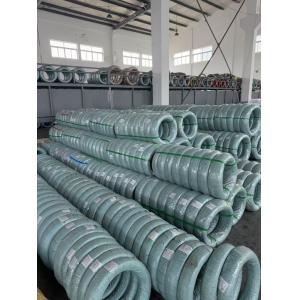Matt 200 / 300 /400 series Stainless Steel Spring Wire
Construction Stainless Steel Spring Wire 302 Stainless Steel Wire JIS G4314 Standard
General Properties
302 is a variations of the 18% chromium / 8% nickel austenitic alloy, which is the most familiar and the most frequently used in the stainless steel family. Alloy 302 is a slightly higher carbon version of 304, often found in strip and wire forms. It is a tough, ductile grade that demonstrates comparable corrosion resistance, is non-magnetic, and is not hardenable by heat treatment. Alloy 302 is usually used in its annealed condition and has a high ease of fabrication and formability.
Chemical Properties:
|
C |
Mn |
Si |
P |
S |
Cr |
Ni |
N |
| 302 |
max: 0.15 |
max:2.0 |
max: 0.75 |
max: 0.045 |
max: 0.03 |
min: 17.0 max: 19.0 |
min: 8.0 max: 10.0 |
max: 0.10 |
Mechanical Properties:
| Grade |
Tensile Strength ksi (min) |
Yield Strength 0.2% ksi (min) |
Elongation % |
Hardness (Rockwell B) MAX |
| 302 |
75 |
30 |
40 |
92 |
Physical Properties:
Density
lbm/in3 |
Thermal Conductivity
(BTU/h ft. °F) |
Electrical
Resistivity
(in x 10-6) |
Modulus of
Elasticity
(psi x 106 |
Coefficient of
Thermal Expansion
(in/in)/
°F x 10-6 |
Specific Heat
(BTU/lb/
°F) |
Melting
Range
(°F) |
| at 68°F: 0.285 |
9.4 at 212°F |
72.0 at 70°F |
28 |
9.6 at 32 – 212°F |
0.1200 at 32°F to 212°F |
2500 to 2590 |
|
12.4 at 932 °F |
|
|
10.2 at 32 – 1000°F |
|
|
|
|
|
|
10.4 at 32 – 1500°F |
|
Corrosion Resistance
1, Provides useful resistance to corrosion on a wide range of moderately oxidizing to moderately reducing environments
2, The 18 -19% of chromium which this alloy contains provides resistance to oxidizing environments such as dilute nitric acid.
3, Resistant to moderately aggressive organic acids such as acetic, and reducing acids such as phosphoric.
4,’The 9-11% of nickel contained in this alloy provides resistance to moderately reducing environments.
Machinability
Slow speeds and high feeds will overcome this alloy’s tendency to work-harden
Due to gummy chips, it is recommended that chip breakers are used on all tooling
Weldability
Can best be welded by resistance or shielded fusion methods
Post weld annealing dissolves the chromium carbide and is recommended for maximum resistance to intergranular attack
Hot Working
Uniform heating to 2100oF will allow this allow to be forged, upset and headed successfully
Do not work below 1700oF
Cold Working
Will dramatically increase the hardness of this material; however, it is quite ductile and may readily be drawn, spun and upset
Causes alloy 302 to become magnetic
Post-fabrication annealing is necessary to retain maximum corrosion resistance and a non-magnetic condition
